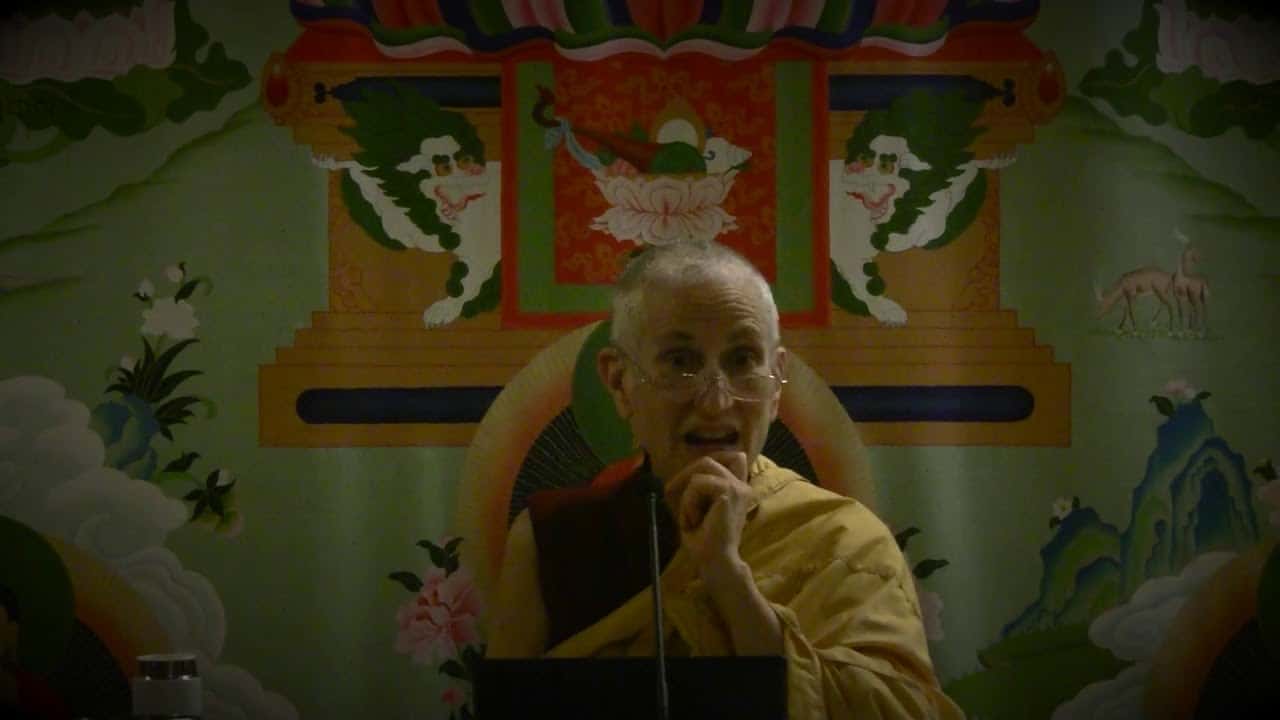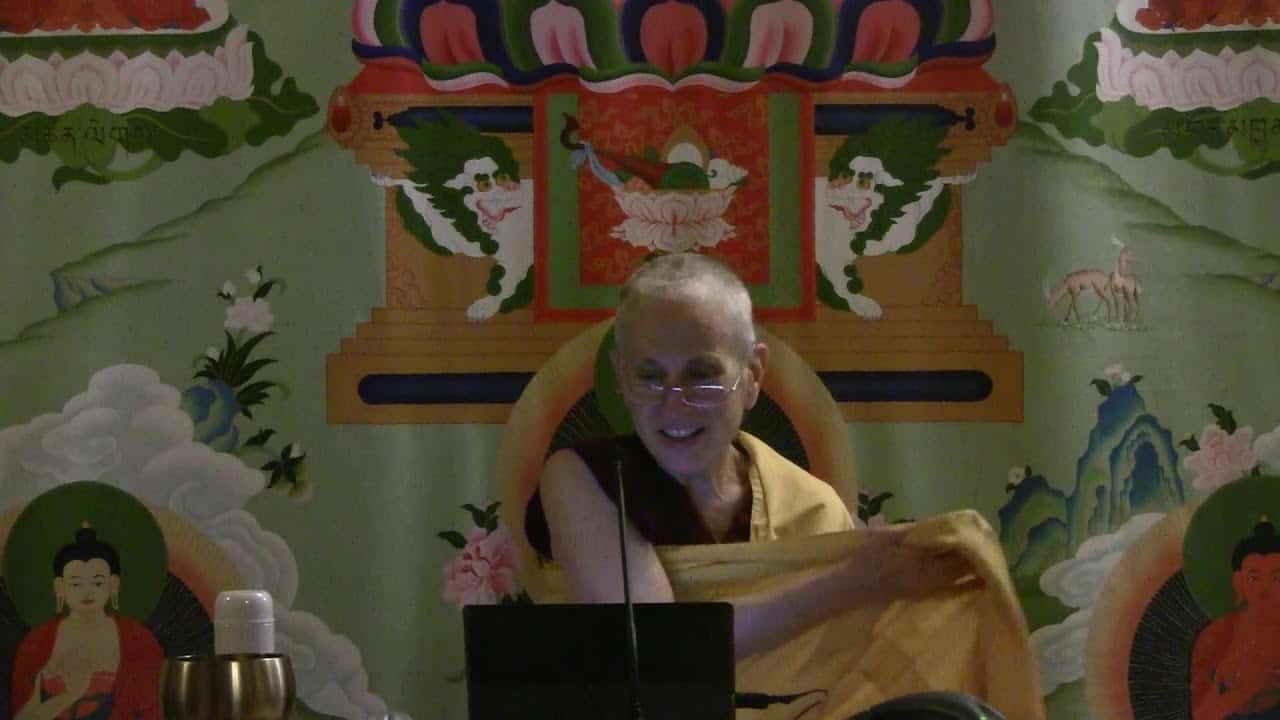The power of rejoicing
Part of a series of short commentaries on the Amitabha sadhana given in preparation for the Amitabha Winter Retreat at Sravasti Abbey in 2017-2018.
- The relationship between confessing and rejoicing
- Seeing the good qualities of others as well as of ourselves
- The painfulness of jealousy
- True self-confidence
Let’s continue with the seven-limb prayer. We already talked about prostrations and offerings, and then confession (or repentance). The one that comes following that is rejoicing.
I find a big relationship between confessing and rejoicing. Confessing we’re purifying our own negativities. Rejoicing we’re being happy about our own virtue and other people’s virtue. So I think it’s very good those two are coupled together. Especially when we’re doing purification, sometimes we can think, “Oh, I have so much to purify, ugh.” And our mood goes down. (Actually, it shouldn’t, we should be happy that we’re purifying…. But anyway, our mind doesn’t always work the way it should.) So sometimes we get a little bit deflated when we’re purifying. But rejoicing elevates the mind. And we rejoice at our own and others’ virtue.
I think that’s really important. Rejoicing in our own virtue helps us see what we are doing well and to appreciate that, to not be so critical, to learn to be happy about the Dharma practice we do and to feel good about that. That’s very important. Having a happy mind, being able to rejoice at our own virtues. Very important for being able to practice.
Rejoicing at others’ virtue is important, too, because without doing that then we fall into jealousy. I’ve noticed that Lama Zopa RInpoche–I don’t know if he’s still doing it now, but for many years–whenever he would lead the seven-limb prayer he would stop after the line of rejoicing and have silent meditation. And I thought, “Why is he doing that?” Well, clearly it was because he wanted us to reflect more on rejoicing.
The thing is that when we’re able to rejoice at our own and others’ virtue then the whole community is happier and everybody gets along better. When we can’t rejoice at our own and others’ virtue then we are jealous of the other people we live with, we’re resentful, we’re just not very pleasant to be with. We’re competitive. And it just creates a really bad energy, whether it’s in a monastery, or even in the secular world in a family, in an office, in a factory. If we can’t rejoice at the good qualities of others, and the good opportunities of others, and we remain just jealous, it creates such a bad atmosphere. And then nobody wants to be there.
True or not true?
Also, my own experience with jealousy is it is so painful. I’m so unhappy when I’m jealous. I remember when there was some time when I was living in India and I was very jealous because other people got to be closer to my teacher than I got to be, and they got to be in his room and do puja with him at four in the morning and serve him tea and do all these other things, and I was given other tasks to do. Which now I see, actually, the other tasks I was given to do was because he trusted me to do those things well. Or to learn from it. Or something. But anyway, i didn’t see that at the time, and I was just jealous. And oh, I was so miserable. And I just remember one day sitting out in the garden and saying, “I have to stop this jealousy because I can’t stand the misery anymore.” So then I started really trying to rejoice in others’ virtue and opportunities and good qualities, and so on.
It just makes the mind so happy when we can rejoice. When we can look at other people and realize that we all have different talents, we all have different abilities. Other people can do things we can’t do. Isn’t that wonderful? Other people are better than we are. Thank goodness! Isn’t it good that other people are better than we are? Because if I were the best one, boy, we have big problems. It’s really good that there are people who are better. That means I can learn from them. It means other people can learn. It means society can progress. It’s really good to be glad about that.
Also to realize that to have self-confidence we don’t need to compete with other people and come out victorious. That is not a good basis for self-confidence. Why? Because the things we compete about with other people are all impermanent. And if you develop self-confidence on a basis of an impermanent quality or an impermanent opportunity then your self-confidence is not going to be stable. Like, “I have confidence because I got to do this and they didn’t.” “I have confidence because I’m more attractive…. I’m more intelligent…. I do this… I do that….” If we have that attitude what happens when we get old and our mind isn’t so clear, and when our health isn’t so good, and when we don’t look so attractive, and when we can’t do the athletic things we used to do, then our self-confidence falls.
If we have a stable basis for self-confidence, understanding our buddha nature and our potential, then that’s not going to change. And then we’re not going to get involved in competing with other people and comparing, and being jealous, and being arrogant, that whole mess, because we’ll believe in ourselves and feel good about ourselves.
That’s really important, I think, to be a happy human being in this life, and to be able to create merit. They say that rejoicing is the lazy person’s way to create a lot of merit. In other words, you don’t even need to do what the other people are doing, you can just sit there and rejoice and that creates merit. That’s a good deal, isn’t it? But it’s so hard to make our mind feel happy about other people being better than we are, or for other people having an opportunity that we don’t. And yet, it doesn’t involve…. Milarepa had to lift these two boulders, and build towers. And people go off to war for all sorts of reasons, and they do all sorts of dangerous and difficult things, and all we have to do is sit there. And yet it’s so hard to get our mind to move into a rejoicing mode. Kind of strange. Isn’t it? Really strange. Especially when there are so many benefits that come from rejoicing, including our own peace of mind, accumulating a lot of merit, getting along better with other people, creating a harmonious workplace, a harmonious living place. So many benefits come. So we need to kind of engage in this rejoicing much more. So helpful for the mind.
Audience: Venerable if you would be willing to share how you changed your mind to not be so jealous.
Venerable Thubten Chodron: I just started looking at everybody around me and listing off to myself, mentally, what their good qualities were. And really looking. Because before. I mean, I’m very good at noticing people’s bad qualities, and even inventing bad qualities that they don’t have. I’m very good at that. So I tried the opposite. Really looking at people’s good qualities, training my mind to notice their good qualities. And then thinking about those and rejoicing that other people have them. And it really made my mind so much happier, so much more peaceful.
Venerable Thubten Chodron
Venerable Chodron emphasizes the practical application of Buddha’s teachings in our daily lives and is especially skilled at explaining them in ways easily understood and practiced by Westerners. She is well known for her warm, humorous, and lucid teachings. She was ordained as a Buddhist nun in 1977 by Kyabje Ling Rinpoche in Dharamsala, India, and in 1986 she received bhikshuni (full) ordination in Taiwan. Read her full bio.


